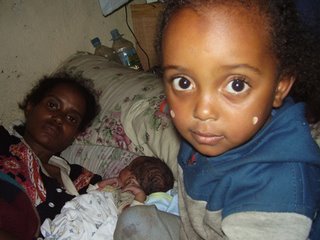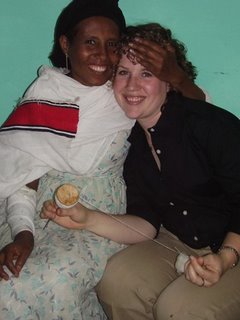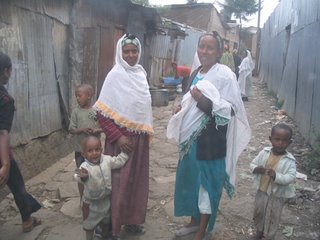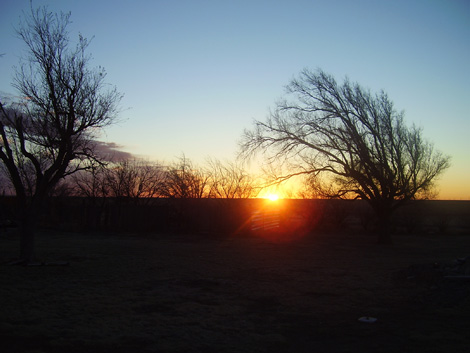As a brief update to my prior post, the access problem has been figured out and a possibly temporary solution has been set up. Thank you to Nathan and Cal! So for the time being I will still be able to post and keep you updated on life in Ethiopia.
I know many of my posts have dealt largely with trivial things; fleas, mice, and goats are a part of life here, but certainly don’t consume it. I find it hard to think through many of the issues I am dealing with, let alone type them into coherent sentences that even need to be said. I’ll start with a few thoughts here but need to stop when this gets ridiculously long!
Were I to stay right where I am right now—sitting on my bamboo sofa in the dimming light, looking out through the open door to the brilliant flowers in my yard, the cloud-filled blue sky, and the mountains in the distance—I could so easily not think about these things. But beyond my gate there is a hurting, broken, dirty, and forgotten world. I struggle even with the existence of that gate; I understand its necessity, but feel that it perpetuates the idea that I can categorize people and worlds and never allow them to collide.
I want to be honest, but at the same time do not want to communicate a one-sided, emotional view of life here. But I am one person, and am also emotional, so please grant grace in your reading!
There are things I love about being here; I love that on Friday I got to hold a precious, cooing, brown-eyed 8 month old girl named Deborah. I was totally overwhelmed that I was the person her mother was relying on to diagnose and treat her child; I knew how unprepared I was for the task, yet knew I had to give it everything I had. I love greeting older women, and the traditional face-touching 3 times to say hello, 4 if I know you, and 5 if I really, really care about you. I love the birds, the flowers, the families, and the animals that make this place unique, yet so African. I love the expat community and the diversity and passion for service I get to see in them. I have many moments when I smile to myself as I realize I live in Africa, and I mull over the journey the Lord brought me on to bring me here.
But at the same time there are things I don’t like about being here. I don’t like that I am a feringe girl who gets hassled constantly, or that nothing is easy and transportation takes forever; however petty it is I miss Walmart and the ease of getting the daily things of life. I don’t like it that the electricity went out 3 times this week and that I am alone in a strange place. I have moments, when I sit in sudden and complete darkness and say, “I live in Africa!” and it’s not such a nice thought.
And then there are things I struggle with, things that pierce me and I want answers to and solutions that I can implement; there are things that cry out for attention and thought and struggle. Yesterday I was walking in the Piazza, one of the “shopping” districts of the city. A middle aged man in ragged, dirty clothes and a drooping cloth hat stretched out his hand to me as I passed and said, “Sister, sister”. He didn’t know how right he was for here I am a “sister” (nurse).
Beggars are everywhere here—whether you are walking, driving, riding. “Money, money”, “You, you”, “Hungry, hungry”. I hear the plaintive words over and over and they come from different mouths. Some tiny barefoot children, many worn mothers with babies strapped with cloth to their backs, maimed men and women who have lost part or all of arms or legs and pull themselves along close to the ground between moving vehicles, searching for a few santims (cents). I get frustrated by the constant hassling by beggars, then get frustrated that it frustrates me! I understand the idea of begging is perpetuated by the culture; if you must be good to get to heaven, you must give, and so you must have people to give to. So nothing is done to address the real issues, and no one expects anything to change. I understand many expat’s refusal to give, or only giving to certain people, as a stand against begging that is tolerated as an acceptable profession.
But as much as I get all that, I cannot turn my mind away from words that reverberate: “Extend your soul to the hungry, and satisfy the afflicted soul” . . . “Give to him who asks you” . . . “Give to the poor” . . . I don’t know how this works out in practice, and that is what I struggle with. But I am learning that there is no easy, sterile, clean answer; I never want to get to a place where I give a few santims just to satisfy my conscience. Mercy is about hands and dirt and grime, about totality and submission and humility. That is what we who are His have received, and He has called us to no less.
 One of our beneficiary's homes; with her little girl and newborn boy. I was visiting their home to check out the tiny new little one.
One of our beneficiary's homes; with her little girl and newborn boy. I was visiting their home to check out the tiny new little one. With Tesfaye; his name means "my hope".
With Tesfaye; his name means "my hope". With Asnakech, one of the beneficiaries who is dearest to my heart. She was teaching me to spin cotton! I'm not very good at it:)
With Asnakech, one of the beneficiaries who is dearest to my heart. She was teaching me to spin cotton! I'm not very good at it:) A family on the rainy streets of Addis
A family on the rainy streets of Addis Isn't she beautiful? We were captivated by her smile, her laugh, and her dancing; she was captivated by our cameras:) Our taxi had run out of gas on the street, so we got to spend a little bit of time talking to the two kids.
Isn't she beautiful? We were captivated by her smile, her laugh, and her dancing; she was captivated by our cameras:) Our taxi had run out of gas on the street, so we got to spend a little bit of time talking to the two kids. Eating Ethiopian--injera (the pancake-looking bread) with different kinds of wats (stews, in a way), cheese, and vegetables. Right hand eating only!
Eating Ethiopian--injera (the pancake-looking bread) with different kinds of wats (stews, in a way), cheese, and vegetables. Right hand eating only! Driving downcountry a few weeks ago.
Driving downcountry a few weeks ago.

